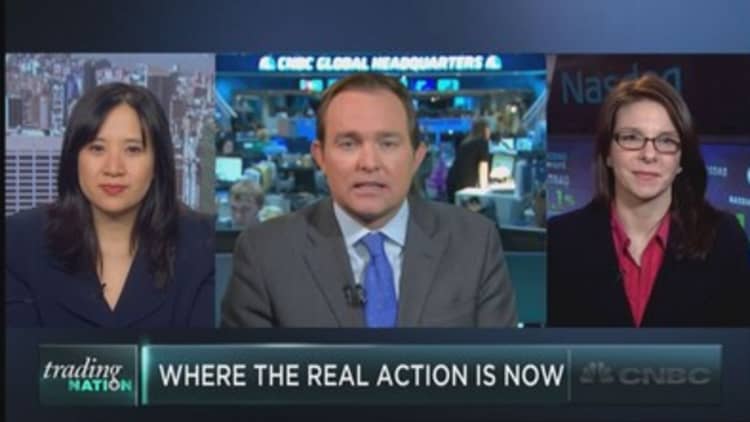
These days, real excitement isn't in the stock market.
While sharp intraday moves in the have become more common of late, overall volatility has remained low. Meanwhile, big swings in bonds, commodities, and especially currencies are running rampant.
Over the course of 2015, the popular oil ETF USO has experience 3½ times the daily volatility of the SPDR S&P 500 ETF (SPY). And bonds haven't been quiet, either—the Barclays bond ETF (TLT) has experienced 25 percent greater daily historical volatility than the SPY.
For Stacey Gilbert, head of derivative strategy with Susquehanna Financial Group, the explanation is simple. Recently, all markets have been responding to central banks, as Europe embarks on new easy money policies, and the Federal Reserve makes slow-motion (but not "patient") gestures toward eventually raising short-term rates. But some asset classes are more unified in their response to central bank moves.
The generally strong U.S. dollar "is great for some companies, not great for others. So therefore, you have a little bit of diversification in the stock markets," Gilbert said.
Meanwhile, expectations about central bank actions and inflation are critical for fixed income investors. And commodities often move inversely to the dollar, given that as each dollar becomes worth more, it should take fewer of them to buy the same amount of goods.
The currency volatility certainly showed no signs of abating on Wednesday. As the Fed presented a move dovish statement than expected, the US dollar index fell as much as 3 percent, a gigantic move for a currency, especially after marching in a seemingly indomitable path higher over the last eight months.
"I certainly think the volatility in the FX market is going to continue," said Kathy Lien, managing director of FX strategy with BK Asset Management. "For FX traders, volatility means opportunity."
Indeed, there has been plenty of opportunity for macro traders of late. And in fact, that could itself spur volatility—particularly because so many firms have been in the same big trades, such as shorting the euro against the dollar.
"It seems like all of the quant funds are currently all jammed into the same trade. Intermarket relations are at an all-time high, and I feel this will continue till the returns start to force them out of their current strategies," said Dennis Davitt, chief investment officer of Harvest Volatility Advisors.
And in fact, because so many were long dollar and/or short euros into the Fed, "we will continue to see unwinds. And liquidity dries up when everyone runs for the same door," the options expert said.
Translation: The macro volatility may not be over just yet. And that could make stocks a more restful place to keep one's money for the time being.






